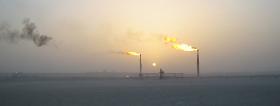- europages
- >
- COMPANIES - SUPPLIERS - SERVICE PROVIDERS
- >
- biogas plant
Results for
Biogas plant - Import export

EUROPEM
Belgium
Utility Flares (Pipe Flares) are the most basic flare design available, to provide a robust, reliable and flexible solution for the flaring of large volumes of low pressure waste gas when smokeless operation is either not required or can be achieved without an assisting medium (like steam, air or gas). Reliable operation at both full load and partial load is possible. Key features Flame holders fitted on the periphery of the flare tip ensure stable operation. These flame holders provide a zone of recirculated flue gases, which prevent flame lift off, from the flare tip. Wind deflectors to prevent flame impingement, which prevent a low pressure zone, downwind of the tip. Pilot burner arrangement to further stabilise the flame. Use of high grade alloys to enhance lifetime of the flare tip Use of dynamic seal to reduce purge gas requirements and prevent flash back. Key advantages Low investment and operational costs Low maintenance costs with the use of high grade alloys and the robust design. Reliable and stable flaring in a wide range of operating conditions Large turn-down ratio Applications Upstream oil & gas sector LNG terminals and NG compression stations Chemical and petrochemical industries including refineries Food processing industries Municipal solid waste treatment (biogas and landfill gas) plants Temperature controlled combustors and thermal oxidisers.
Request for a quote
DE SMET ENGINEERS & CONTRACTORS
Belgium
DSEC's commitment on the construction of Bioethanol plants is based on a very specialized technical knowledge of the Ethanol production processes; in this article you will find a more detailed understanding about the Downstream Process. The alcohol in the fermented mash is then concentrated by means of distillation and rectification, before the required water content of ethanol is regulated in the dewatering process. The accrued residues from distillation, the so-called stillage, is first evaporated and then dried to animal feed, the so-called DDGS. However, the production (drying) of DDGS requires a considerable amount of primary energy (e.g. fuel oil or natural gas); therefore, if feedlots are nearby, animal feed will be sold in wet condition, so called WDGS. For sugar cane and molasses the residue, so called vinasses, was returned to the fields as fertilizer- due to sustainability reasons and change in legislation, spraying of vinasses on the fields is mostly forbidden in the meantime. In the past, direct combustion of DDGS turned out to be unfeasible because of procedural difficulties and lacking efficiency (due to the high water content of the stillage). The realisation of a biogas plant could not be achieved in large scale so far because of the enormous quantities of stillage and their high organic stress. Combination of ethanol production with biogas respectively, biomass burning results in different biorefinery concepts or so called next generation technology.
Request for a quoteDo you sell or make similar products?
Sign up to europages and have your products listed
Results for
Biogas plant - Import exportNumber of results
2 ProductsCompany type
Category